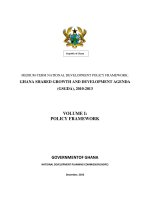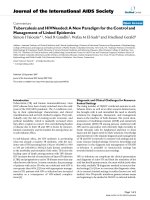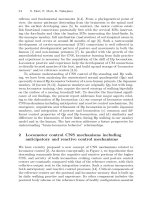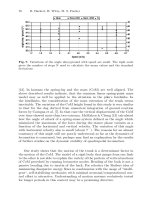fardoust et al (eds.) - postcrisis growth and development; a development agenda for the g-20 (wb, 2011)
Bạn đang xem bản rút gọn của tài liệu. Xem và tải ngay bản đầy đủ của tài liệu tại đây (5.42 MB, 588 trang )
POSTCRISIS
GROWTH AND
DEVELOPMENT
Shahrokh Fardoust Yongbeom Kim Claudia Sepúlveda
EDITORS
POSTCRISIS
GROWTH AND
DEVELOPMENT
POSTCRISIS
GROWTH AND
DEVELOPMENT
A Development Agenda for the G-20
Shahrokh Fardoust
Yongbeom Kim
Claudia Sepúlveda
Editors
Papers Presented at the Korea–World Bank High Level Conference on Post-Crisis Growth
and Development co-hosted by the Presidential Committee for the G-20 Seoul Summit
and the World, Bank, with the support of the Korea Institute for International Economic
Policy (KIEP).
© 2011 The International Bank for Reconstruction and Development/The World Bank
1818 H Street NW
Washington DC 20433
Telephone: 202-473-1000
Internet: www.worldbank.org
E-mail:
All rights reserved
1 2 3 4 13 12 11 10
This volume is a product of the staff of the International Bank for Reconstruction and Development/
The World Bank. The findings, interpretations, and conclusions expressed in this volume do not
necessarily reflect the views of the Executive Directors of The World Bank or the governments they
represent. The World Bank does not guarantee the accuracy of the data included in this work.
The maps in this book were produced by the Map Design Unit of The World Bank. The boundaries,
colors, denominations, and any other information shown on these maps do not imply, on the part of
The World Bank Group, any judgment on the legal status of any territory, or any endorsement or
acceptance of such boundaries.
Rights and Permissions
The material in this publication is copyrighted. Copying and/or transmitting portions or all of this
work without permission may be a violation of applicable law. The International Bank for Reconstruction and Development/The World Bank encourages dissemination of its work and will normally
grant permission to reproduce portions of the work promptly.
For permission to photocopy or reprint any part of this work, please send a request with complete
information to the Copyright Clearance Center Inc., 222 Rosewood Drive, Danvers, MA 01923, USA;
telephone: 978-750-8400; fax: 978-750-4470; Internet: www.copyright.com.
All other queries on rights and licenses, including subsidiary rights, should be addressed to the Office
of the Publisher, The World Bank, 1818 H Street NW, Washington, DC 20433, USA; fax: 202-522-2422;
e-mail:
ISBN: 978-0-8213-8518-0
eISBN: 978-0-8213-8523-4
DOI: 10.1596/978-0-8213-8518-0
Library of Congress Cataloging-in-Publication Data has been requested.
Contents
Foreword
xv
Justin Yifu Lin and Il SaKong
Acknowledgments
About the Editors and Conference Presenters
Abbreviations
Postcrisis Growth and Development:
A Development Agenda for the
G-20: Overview
xix
xxi
xxxiii
1
Shahrokh Fardoust, Yongbeom Kim, and
Claudia Sepúlveda
1
Why Development Should Be a
Priority Agenda for the G-20
63
Il SaKong
2
Why the G-20 Should Be Interested
in the Development of the G-160
67
Ngozi Okonjo-Iweala
3
A Global Economy with Multiple
Growth Poles
77
Justin Yifu Lin
Comments by Ifzal Ali
106
Comments by Jong-Wha Lee
110
v
vi
Contents
Comments by Tunde Lemo
Chair’s Summary by Trevor Manuel
4
114
116
The G-20 and Global Development
119
Zia Qureshi
Comments by Danny Leipziger
Comments by Mahmoud Mohieldin
155
Comments by Robert Vos
160
Chair’s Summary by Graeme Wheeler
5
152
169
Joint Discovery and Upgrading of
Comparative Advantage: Lessons
from Korea’s Development Experience
173
Wonhyuk Lim
Comments by Danny Leipziger
Comments by Klaus Rohland
232
Chair’s Summary by Yoon Je Cho
235
Achieving the Millennium Development
Goals in the Aftermath of the Global
Economic Crisis
239
Keeping the Promise
6
227
241
Jomo Kwame Sundaram
The Millennium Development
Goals after the Crisis
253
Delfin Go and Hans Timmer
Chair’s Summary by Shahrokh Fardoust
7
269
Aid for Trade: Building on Progress
Today for Tomorrow’s Future
279
Bernard Hoekman and John S. Wilson
Comments by Arancha González
316
Comments by Alan Winters
321
Chair’s Summary by Ernesto Zedillo
326
Contents
8
Infrastructure and Sustainable
Development
329
Marianne Fay and Michael Toman, with
Daniel Benitez and Stefan Csordas
Comments by Kiyoshi Kodera
Comments by Haeryong Kwon
376
Comments by Helen Mountford
9
373
378
Food Security: The Need for
Multilateral Action
383
Christopher Delgado, with Robert Townsend,
Iride Ceccacci, Yurie Tanimichi Hoberg, Saswati
Bora, Will Martin, Don Mitchell, Don Larson,
Kym Anderson and Hassan Zaman
Comments by David Nabarro
Comments by Cheikh Sourang
429
Comments by Joachim von Braun
433
Chair’s Summary by Hak-Su Kim
10
426
437
Toward Universal Access: Addressing
the Global Challenge of Financial Inclusion
439
Peer Stein, Bikki Randhawa
and Nina Bilandzic
Comments by Alfred Hannig
492
Comments by Yongbeom Kim
495
Chair’s Summary by Princess Máxima of the
Netherlands
499
Appendix A Matrix of Proposed Policy
Actions: A Development Agenda
for the G-20
503
Appendix B G-20 and Non–G-20
Selected Economic and Social Indicators
509
Index
525
vii
viii
Contents
Boxes
1. A Summary of the Roundtable Policy Discussion
3.1. Examples of Knowledge Sharing for
Export Development
4.1. Infrastructure Investment Needs in Africa
8.1. Estimating Infrastructure Expenditure Needs
8.2. A Need for Better Data on Public Infrastructure
Spending
8.3. Some Suggestions for Reducing the Costs of PPPs
8.4. Opportunities for Increasing Infrastructure Funding
10.1. Mexico: An Example of Development Banks
Kick-Starting Financial Services
10.2. G-8 Summit (L’Aquila, July 2009) to 5x5 Declaration
10.3. Case Study: M-Pesa (Kenya)
10.4. Mzansi Accounts
10.5. Lack of Financial Capability in Practice
10.6. Government-Led Initiatives in Data Collection
in India
10A.1. Microfinance amid the Financial Crisis
56
102
133
342
346
351
354
456
461
463
466
471
476
482
Maps
10.1. Global Map of the Financially Included
10.2. Recent Examples of Countries Advancing Full
Financial Inclusion
447
452
Figures
1. Key Pillars for Policy Action to Achieve Strong,
Sustainable, and Balanced Growth
2. Real GDP Growth in Developing and High-Income
Countries, 1991–2010
3. Contributions of Developing and High-Income
Countries to World GDP Growth, 1991–2010
4. Developing and High-Income Countries’ Share
of World GDP, 1980–2008
4
8
9
10
Contents
5. Developing and High-Income Countries’ Share
of World Exports, 1980–2008
6. Developing and High-Income Countries’ Share
of World Net FDI, 1980–2008
7. Progress of the Nine G-20 Developing Countries
toward the MDGs
8. Effect of Growth Acceleration and Deceleration
on Key Human Development and Gender
Indicators in All countries, 1980–2008
9. The G-20’s Approach to Development
3.1. Industrial Production Index, 1993–2009
3.2. Interest rates in the Euro Area and the United States,
1999–2010
3.3. Gap in Growth Rates between Developing Regions and
High-Income Countries, 2000–08
3.4. G-20 Shares of Global Gross National Income
3.5. Increasing Trade and Capital Flow Links
3.6. Evolution of Net Capital Flows to Developing Countries
3.7. Risk of Low Income Countries Debt Distress
4.1. Growth Is Recovering, But Sustainability Will Depend
on Supportive Policies
4.2. Trend, but Not Cyclical, Growth Decoupling
4.3. Output Gaps Projected to Decline Only Gradually
4.4. Impact of Slower Growth on Selected MDGs
4.5. Progress of Developing-Country G-20 Members
toward MDGs
4.6. Increasing Fiscal Strains in Developing Countries
4.7. Core Spending at Risk
4.8. Almost Half of Global Growth Comes from
Developing Countries
4.9. Developing Countries Are Leading Recovery
in Trade
4.10. Net Private Capital Flows to Developing Countries:
Only a Modest Recovery
4.11. Developing-Country Financing Gaps Will
Remain Large
4.12. Impact on Poverty of a 0.5 Percentage Point Decline
in GDP Growth Rate
10
11
13
14
31
80
81
85
86
87
91
95
121
123
124
125
127
128
129
131
131
135
135
136
ix
x
Contents
4.13. Official Development Financing: ODA and Multilateral
Lending
4.14. Collapse and Recovery of World Trade: Current
versus Past Crises
4.15. Trade Measures Implemented Worldwide and
by G-20, November 2008–May 2010
4.16. Combined G-20 Use of Antidumping,
Countervailing Duties, and Safeguards
4.17. Net Financial Transfers to Developing Countries,
by Region, 2000–09
4.18. Trade Shocks in Developing Countries by
Product-Based Export Specialization, 2007–10
4.19. Per Capita GDP Growth of Developing Countries
by Dominant Technology-Content of Export
Specialization, 1960–2000
5.1. Korea’s Journey from Poverty to Prosperity
5.2. Sectoral Composition of Korea’s GDP
5.3. Korea’s Exports, Imports, and Investment
Relative to GDP
5.4. Korea’s School Enrollment Rate
5.5. Conceptual Diagram for the HCI Drive
5.6. International Comparison of Revealed
Comparative Advantage
5.7. Korea’s Gross R&D Expenditure
5.8. Korea’s Business R&D Expenditure: From Assimilation
to Innovation
5.9. Debt-Equity Ratio and Interest Coverage Ratio
in Korea’s Manufacturing Sector
6.1. Production Loss from Trade Shocks in
Sub-Saharan Africa
6.2. Median Government Fiscal Balance
6.3. Progress on the MDGs
6.4. Net Enrollment Rates in Primary Education,
Selected Countries
6.5. Effects of Growth Accelerations and Decelerations
on Key Human Development and Gender Indicators,
All Countries
139
144
146
147
163
166
167
174
174
175
186
202
207
210
211
213
256
258
259
261
262
Contents
7.1. ODA Commitments to Aid for Trade, 1995–2008
7.2. Aid for Trade by Recipient Group, Bilateral vs.
Multilateral Donors
7.3. Trends in World Bank Trade Lending, 2001–09
7.4. Matching Demand with Supply of Aid
for Trade, 2005
7.5. Services Trade Restrictiveness Index
7.6. Developing Countries Account for an Increasing
Share of World Trade
7.7. Southern Countries Still Export Fewer Varieties
Than Northern Ones
8.1. Impact of Infrastructure Quantity and
Quality on Growth
8.2. Impact of Infrastructure Quantity and Quality on
Income Inequality
8.3. PM10 Ambient Concentration by
Region in 2006
8.4. Average SO2 Emissions Related to Electricity
Production, by Region, 2000
8.5. Average CO2 Emissions Related to Electricity
Production, by Region, 2006
8.6. Connection Delays Are Substantial in
Developing Countries
8.7. Electricity-Generating Capacity per Person in
Developing and High-Income Countries, 2007
8.8. The Key Steps of a Good Infrastructure Assessment
8.9. Investment Commitments to PPI Projects
Reaching Closure in Developing Countries,
1990–2008
8.10. PPI Infrastructure Projects by Sector
8.11. Geographic Concentration of PPI in Developing
Countries
8.12. Change in Importance of PPI by Region
8.13. Distribution of PPI by Income Group
8.14. The Balance of Infrastructure Financing
and Funding
9.1. Global Undernourishment Incidence Trend
285
286
287
290
297
300
301
335
336
337
337
338
341
341
344
347
348
349
349
350
352
389
xi
xii
Contents
9.2. Real Domestic and International Rice Prices,
India, 1965–2004
9.3. Declining Food Prices Amid Rising Stocks
9.4. Grain Stock Destocking after 1983 and 1997
9.5. Food and Grain Prices, 2000–10
9.6. Slowing Growth Rates of Yields for Major
Cereals, Developing Countries
9.7. Local Grain Price Volatility in Ethiopia
9.8. The Distribution of Safety Net Programs
10.1. Labor Force in Developing Countries
10.2. Collaborative Diamond Model for Financial Inclusion:
Generation 1.0 (1990s–2010)
10.3. Collaborative Diamond Model for Financial Inclusion:
Generation 2.0 (2010–2020s)
10.4. Reaching the Financial Inclusion Target: Key Pillars
10.5. Defining Financial Inclusion
10.6. High Turnover in Financial Instruments: Rural
and Urban
10.7. Access and Payment Transactions Gaps
10.8. Seven Benefits of Financial Inclusion
10.9. Access to Finance and Millennium
Development Goals
10.10. Current and Potential Impact of Financial
Infrastructure
10.11. Remittance Cost across Selected
Country Corridors
10.12. Supply vs. Gap for Financial Products
10.13. Global Trends Shifting the Financial Inclusion
Frontier Forward
10.14. Three Dimensions of Responsible Finance
10.15. Measuring Financial Access: Key Existing Reports
393
396
397
398
409
412
416
441
442
443
444
445
446
448
449
450
457
461
462
463
469
473
Tables
1. Percentage of Poverty in Developing Countries,
1981 and 2005
12
Contents
3.1. G-20 Shares of Global Gross National Income
and Global Exports
3.2. Share in Global GDP Growth
4.1. Base-Case Growth Outlook for Developing Countries
4.2. Outlook for Poverty in Developing Countries
5.1. Comparative Growth Experience, 1960–2004
5.2. Investment and Savings in Korea, 1962–1981
5.3. Targets for the HCI Drive
5.4. Investment Requirement Estimates for the HCI Drive
5.5. Projected Demand and Supply of Technicians
5.6. Technical High School Management System
5.7. Korea’s Top Ten Exports
8.1. Household Access to Infrastructure in Developing
Countries
8.2. Infrastructure Spending Needs and the Funding
Gap in Africa
9.1. Countries with the Largest Increase in Domestic
Price of Main Staples
10.1. Current Measurement of the Unbanked
10A.1. Microfinance at a Glance, 2008
B1. G-20 and Non–G-20 Countries at a Glance, 2008
B2. Share in the World Economy
B3. Economic Growth
B4. Integration with the Global Economy
B5. Population Size and Child Mortality
B6. Participation in Education
B7. Science, Technology, Communications, and Trade
B8. Poverty Rates
84
88
122
124
185
192
200
201
204
204
212
340
344
407
440
479
510
512
514
516
518
520
522
524
xiii
Foreword
Today’s fast-evolving global economy accompanies rapid economic
power shifts. Some developing countries are emerging as economic powers. Others are becoming new poles of growth. But many are still struggling to attain their potential in this new era. With economic destinies
no longer defined by north or south, east or west, the world is in the
process of rebalancing economic, political, and social power.
In this multipolar world only multilateral approaches can provide
global solutions to global problems. The Group of 20’s rapid response to
shore up confidence in the wake of the financial crisis is a perfect example of the continuing need for international economic cooperation and
coordination. There is little doubt that the actions by the G-20 prevented
the global economy from sliding into another Great Depression. Despite
evidence of economic improvement, however, the global recovery
remains fragile, making international economic policy coordination all
the more important.
Now that many of the G-20 countries are recovering, it is time to
think about those countries that are not part of this forum, but whose
growth and development prospects are of equal importance in reestablishing and ensuring global prosperity.
For this, the world needs a more strategic approach to development—
and a more inclusive leadership structure. The G-20 has both the
convening power and the legitimacy to assume a leadership role and
put forth key issues that require immediate global attention. By tackling the most pressing issues and those with the greatest potential
benefit to human well-being, it can fulfill its role as a provider of
global public goods.
xv
xvi
Foreword
The developing world is accruing an increasing share of world output
and helping to drive recovery with sustained demand for imports. As
growth rebalances, emerging economies will provide new and robust
markets for capital goods, investment, and knowledge. Yet it is impossible for the world to sustain balanced growth as long as there are persistent gaps in development. As the Toronto Summit Leaders’ Declaration
states: “Narrowing the development gap and reducing poverty are integral to our broader objective of achieving strong, sustainable, and balanced growth and ensuring a more robust and resilient global economy
for all.”
The Republic of Korea—which just turned from an aid recipient to a
donor country in the OECD Development Assistance Committee—
shows that being a developing country is not a permanent state of nature
and is thus well positioned to serve as the bridge between advanced
economies and developing countries. And as the host of the November
2010 G-20 Summit in Seoul, Korea is bringing development issues to the
fore at the G-20, convening multilateral institutions and development
experts from around the world to help formulate multiyear action plans
for the Group to adopt.
In the runup to the summit, Korea collaborated with the World Bank
to host a high level conference, Post-Crisis Growth and Development, on
June 3-4, 2010, in Busan, Korea. The conference covered areas critical to
the global development agenda and central to the G-20’s mandate to
foster “strong, sustainable, and balanced growth.” This volume is a summary of that conference, a record of the conference proceedings, and a
repository of information from leading experts on some of the most
pressing global development issues.
The volume covers such cross-cutting topics as the emergence of
multipolar growth in the postcrisis period, an analysis of Korea’s development experience on how to transform from a low-income country to
an advanced economy, and the impact of the global crisis on achieving
the Millennium Development Goals by 2015. Other topics include infrastructure and sustainable development, promoting aid for trade, ensuring food security, and advancing inclusive finance.
The book makes a strong case for integrating critical development
issues relating to global growth, as well as human development issues more
broadly, into the G-20 agenda and for bringing non-G-20 developing
Foreword
countries on board to ensure their participation in the global recovery and
to enhance the legitimacy and credibility of the G-20 process. It endorses
the concept of multipolar growth, concluding with a strong consensus that
developing countries have an important role to play in sustainable global
growth and will become increasingly more important in the world economy. In order for this to happen, however, there must be a greater focus on
removing obstacles to growth.
The G-20 can help foster stronger growth in developing countries by
focusing on the following areas within its mandate and development
agenda:
•
•
•
•
Facilitating the development of an action plan for increasing public
and private financing of infrastructure, as well as improving the efficiency and environmental sustainability of infrastructure projects
through technical assistance.
Recognizing the importance of trade capacity and market access and
considering the implementation of specific measures, such as aid for
trade and “duty free, quota free” access for least developed countries.
Encouraging agricultural productivity and supporting the fight against
malnutrition by providing additional resources to scale up agricultural
and food security assistance to eligible developing countries.
Convening a global partnership with the relevant stakeholders around
access to finance and financial services to establish a common global
financial goal that not only focuses on credit, but also on a range of
financial products, including payments, savings, remittances, and
insurance.
Responding to the world’s economic development challenges clearly
requires thoughtful leadership and globally coordinated responses. We
hope this volume will be used as a tool and a reference in this process.
Justin Yifu Lin
Il SaKong
Senior Vice President and Chief Economist
Development Economics
The World Bank
Chairman
Presidential Committee for the G-20 Seoul Summit
xvii
Acknowledgments
The Korea–World Bank High Level Conference on Post-Crisis Growth
and Development was a joint effort undertaken by Korea’s Presidential
Committee for the G-20 Seoul Summit and the World Bank, with significant support from the Korea Institute for International Economic
Policy (KIEP).
The conference was conceived and organized under the overall guidance of Justin Yifu Lin, Chief Economist and Senior Vice President of the
World Bank, and Il SaKong, Chairman of the Presidential Committee for
the G-20 Seoul Summit, in conjunction with a core team comprising
Changyong Rhee, Yongbeom Kim, Jae Hwan Kim, Inju Chang, and
Heung Kyu Choi from the Presidential Committee for the G-20 Summit;
Wook Chae, Yul Kwon, Jione Jung, Sukyoung Park, and Jisun Jeong from
the Korea Institute for International Economic Policy (KIEP); and Shahrokh Fardoust, Claudia Sepúlveda, Haeduck Lee, Il Young Park, and
Claire Markgraf from the World Bank.
The team is grateful for the significant contribution made by the
authors, discussants, chairs, and panelists who attended the conference.
The conference benefited from a wide range of consultations, and the
team is grateful to Ngozi Okonjo-Iweala and Graeme Wheeler for their
invaluable support and advice, and to Jeffrey Lewis, Do Hyeong Kim,
Ann Harrison, David Rosenblatt, Vikram Nehru, Ahmad Ahsan, Vinaya
Swaroop, Jim Parks, and Jeff Chelsky for their helpful comments and
suggestions throughout the process. Merrell Tuck-Primdahl, Camille
Funnell, and Roula Yazigi contributed enormously through media and
Web support. The team is also grateful to Ritu Thomas and Muriel
Darlington, who provided excellent pre-conference logistical assistance
xix
xx
Acknowledgments
in Washington, D.C., and to IoConvex in Korea for outstanding logistical
support in Seoul and Busan.
This conference proceedings , which serves as the formal record of the
Korea-World Bank Development Conference in June 2010, was prepared
by a core team comprising Yongbeom Kim from the Presidential Committee for the G-20 Seoul Summit and a team from the Operations and
Strategy Group, Development Economics Vice Presidency of the World
Bank, led by Shahrokh Fardoust and Claudia Sepúlveda. The editors
would like to especially thank Claire Markgraf and Julia Barmeier for
their assistance in reviewing this conference proceedings. We are also
grateful to Fernando Im, Dimitris Mavridis, and Merrell Tuck-Primdahl
for their help at various stage of this project and the Development Data
Group of the World Bank for their comments and quality assurance on
the statistical appendix. The volume was financed by the World Bank’s
Development Economics Vice Presidency and East Asia Poverty Reduction and Economic Management unit, and the Presidential Committee
for the G-20 Seoul Summit. The World Bank’s Office of the Publisher
provided editorial, design, and printing services, under the direction of
Stephen McGroarty, Rick Ludwick, and Denise Bergeron.
About the Editors and
Conference Presenters
Ifzal Ali has been the Chief Economist of the Islamic Development Bank
since 2008. From 2002 to 2008 he was Chief Economist of the Asian
Development Bank, an institution he joined in 1984. Previously, he was
a faculty member at the Indian Institute of Management in Ahmedabad.
He holds a doctorate from Johns Hopkins University.
Amar Bhattacharya is the Director of the Secretariat of the Intergovernmental Group of Twenty-Four on International Monetary Affairs and
Development. Before this, he had a long career at the World Bank, where
he was an advisor to the President and Senior Management on the Bank’s
engagement with key international groupings and institutions, including the IMF, G-7, G-20, OECD, and Financial Stability Forum. He completed his undergraduate studies at the University of Delhi and Brandeis
University and his graduate education at Princeton University.
Yoon Je Cho is the Dean of the Graduate School of International Studies
at Sogang University. His previous positions in the Republic of Korea
include Economic Advisor to the President, Ambassador to the United
Kingdom, Vice President of the Korea Institute of Public Finance, and
Senior Counselor to the Deputy Prime Minister and Minister of Finance
and Economy. He also worked at the World Bank as a senior economist
and at the International Monetary Fund as an economist. He received his
undergraduate degree in economics from Seoul National University and
his PhD in economics from Stanford University.
Christopher Delgado is Strategy and Policy Adviser for the Agriculture
and Rural Development Department at the World Bank. He leads the
xxi
xxii
About the Editors and Conference Presenters
Rural Policies team within the department, coordinates the secretariat
of the Bank’s Global Food Crisis Response Program, and is program
manager for the Global Agricultural and Food Security Program. He
joined the Bank in 2006 after nearly 27 years at the International Food
Policy Research Institute and the International Livestock Research
Institute.
Shahrokh Fardoust is the Director of Operations and Strategy in the
Development Economics Vice Presidency at the World Bank. Before this,
he served as Senior Adviser to the Director-General of the Bank’s Independent Evaluation Group and as Senior Economic Adviser to the Senior
Vice President and Chief Economist. Before coming to the Bank in 1987,
he held positions at the United Nations Secretariat in New York, was a
visiting lecturer in economics at the Wharton School, and served in the
Ministry of Foreign Affairs in Iran. He holds a PhD in economics from
the University of Pennsylvania.
Marianne Fay is the Chief Economist of the Sustainable Development
Network at the World Bank and codirector of the World Development
Report 2010: Development and Climate Change. She has held positions in
different regions of the World Bank (Eastern Europe and Central Asia,
Latin America and the Caribbean, Africa) working on infrastructure,
urban issues, and climate change. She holds a PhD in economics from
Columbia University.
Arancha González is the Chief of Cabinet to World Trade Organization
Director-General Pascal Lamy. Between 2002 and 2004 she was the
European Union spokeswoman for trade and advisor to the European
Union Trade Commissioner. She joined the European Commission in
1996, where she held several positions in the area of international trade. She
holds a degree in law from the University of Navarra and a postgraduate
degree in european law from University Carlos III in Madrid.
Alfred Hannig is the Executive Director of the Alliance for Financial
Inclusion. Previously he was the Director of GTZ’s Sustainable Economic
Development programs in Indonesia and served as the head of the
Financial System Development Program in Uganda. He also worked on
microfinance regulatory and supervisory issues in Bolivia and was the
head of GTZ’s Financial System Development Unit of the Planning and
About the Editors and Conference Presenters
Development Department. He started his career at the German Ministry
for Economic Cooperation and Development.
Bernard Hoekman is the Director of the International Trade Department
at the World Bank. Previous positions at the World Bank include Research
Manager of the trade and international integration team in the Development Research Group, Manager of the trade capacity building program of
the World Bank Institute, and Trade Economist in the Middle East and
North Africa and Europe and Central Asia departments. Before joining
the World Bank in 1993, he was an economist in the General Agreement
on Tariffs and Trade Secretariat in Geneva, supporting the Uruguay Round
negotiations. He is a graduate of Erasmus University, Rotterdam, and
holds a PhD in economics from the University of Michigan.
Hak-Su Kim is currently Chairman of the Asia Economic Community
Foundation, which resides within the Ministry of Foreign Affairs and
Trade of the Republic of Korea. He served as Undersecretary-General of
the United Nations and Executive Secretary of the UN Economic and
Social Commission for Asia and the Pacific for seven years (2000–07).
He earned a PhD in economics from the University of South Carolina
and an MPhil in economics from Edinburgh University.
Yongbeom Kim is Director General of the Global Financial Architecture
Bureau in the Presidential Committee for the G-20 Seoul Summit. Before
assuming this position, he was Director General and Head of the Post
Insurance Unit of Korea Post. He was also Deputy Assistant Chairman of
the Presidential Council on National Competitiveness, Deputy Secretary
for Economic Policies in the Office of the President of Korea, and the
Director of the Banking System Division in the Ministry of Finance and
Economy. From 2000 to 2005, he was a Senior Financial Economist at
the World Bank. He received his doctorate in economics from The
George Washington University on a Fulbright Scholarship.
Kiyoshi Kodera is the Vice-President of the Japan International Cooperation Agency. From 2006 to 2010, he served as Executive Secretary of
the joint World Bank–IMF Development Committee. His World Bank
experience also includes serving as Country Director for Central Asia
and the Alternate Executive Director for Japan. Previously he held senior
positions in Japan’s Ministry of Finance, including Senior Deputy Vice
xxiii









